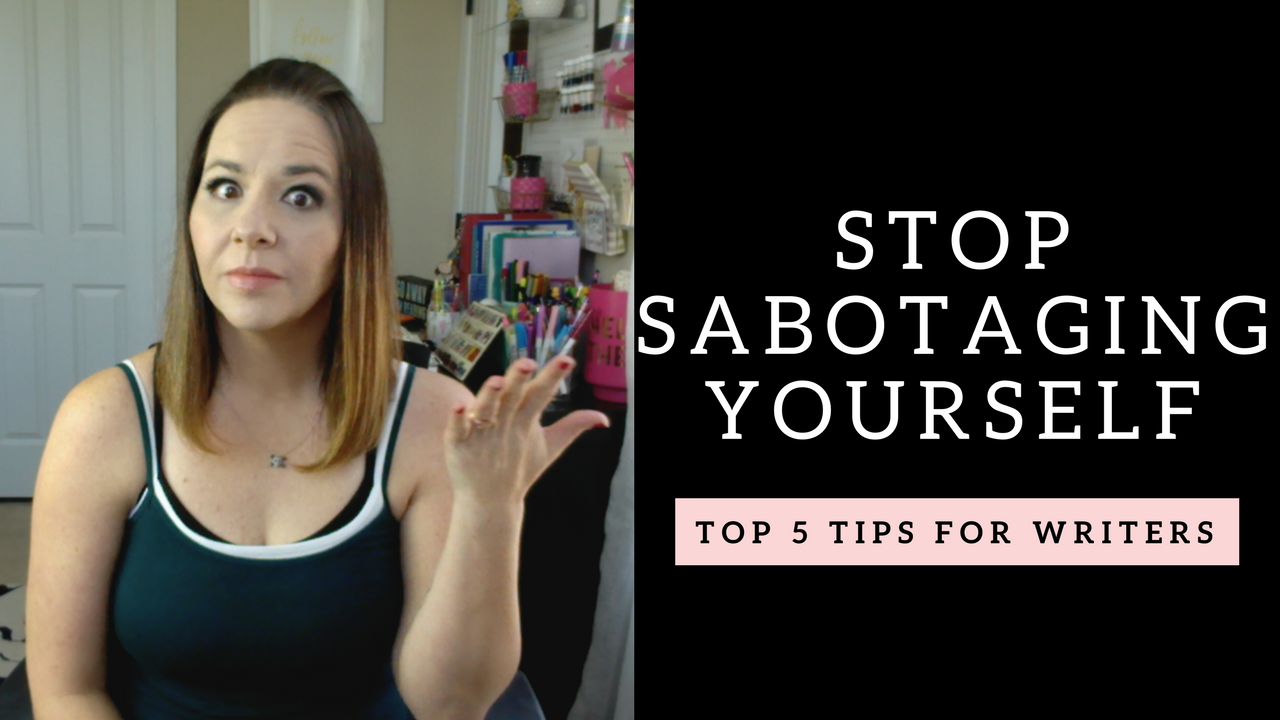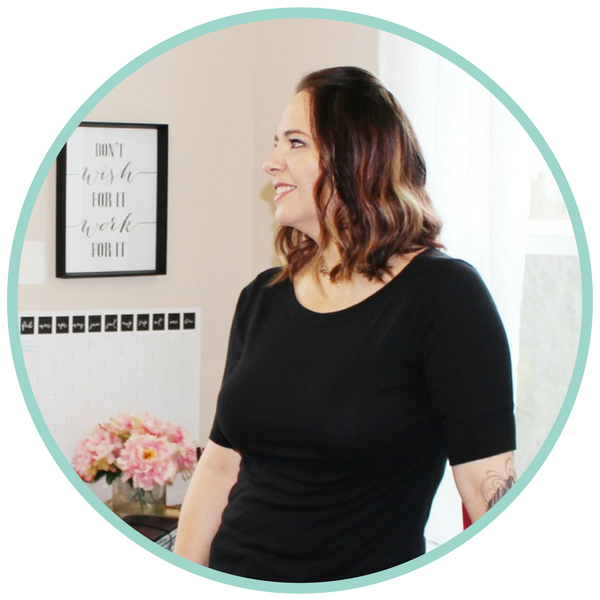

April 19, 2018 by Sarra Cannon
We all want to be successful, but one of the strange mysteries of life is that almost all of us tend to sabotage our own success at some point. We make a plan and set a few exciting goals, but then we don’t sit down and hit our word counts. Sound familiar?
Today’s video post is about five major ways writers (including me!) sabotage their success. Watch my YouTube video below or keep scrolling to read the full post. I would love for you to subscribe to my channel and sign up for my mailing list down at the bottom of this page!
I know you’ve heard them all before. Heck, I’ve probably used them all before myself.
“I don’t have enough time to write.”
“I’m too exhausted. I’ve been working all day. If I just didn’t have this full-time job, I know I could be a successful writer.”
“I’m just not good at marketing like those other people.”
“What I really want to write just isn’t going to make any money.”
I could go on for hours with the limitless array of excuses writers use to keep from doing the things that have to get done in order to success. You know, things like WRITING.
Everyone has the same 24 hours in a day. Every writer has things that suck their energy–be it a full-time job, three toddlers running around, or a sick family member. We all have laundry and groceries. I get it.
The difference is that some writers choose to manage their time, set up a schedule that allows them write when they need to be writing, and they follow through without making excuses.
Take a look at your schedule right now. Are you really using ALL of your time in an important way? (And yes, self-care is important, too!) Or if you really look closely, are you spending a lot of your time scrolling through social media while watching Netflix in your pj’s?
Are you really exhausted? Or are you just scared? What if you established a routine that could raise your energy levels. Listen to music that pumps you up, write down your goals, make a vision board. Seriously, try everything you can to get so excited about this life you’re about to create that there are no longer any excuses that can hold you back.
Are you actually terrible at marketing? Or have you never really studied how to do it because you are terrified you’ll fail?
And what about that genre you’re sure doesn’t sell? I would bet you could go to any online book store and find 100 writers in that very same genre making really great money. Why are you using this as an excuse not to write what you love?
Over the next week, listen to the excuses you use most in your life when it comes to your writing. Listen to the things that come out of your mouth, but also listen to the things that go through your head.
I recognize them most when I know I said I was going to write, but I’m looking for some way to get out of it. Ha! “I know I said I was going to write, but I had terrible nightmares last night, and I just am so tired.”<—This might actually be a true statement, but scrolling Facebook instead isn’t really going to help me in any way. In fact, it will probably drain me even more. On the flipside, usually if I just agree to sit down for 25 minutes, I’ll get more energy and be ready to go again.
Make a list of all of these excuses. You don’t have to show them to anyone, but I need for you to recognize and be aware of them.
Next, take a good hard look at this excuse. Is it even really true? If not, write down the actual truth, even if it hurts or is embarrassing to admit. If it is true, make a list of things you’ve tried so far to help you overcome this obstacle.
Also, as a bonus, make a list of three ways you can change your attitude and mindset around these excuses.
Excuse: I don’t have enough time to write.
The Truth: I actually reallllly like watching a lot of TV after I get off work.
Solutions: Schedule one hour every afternoon to write. DVR that show and watch it on the weekend as a reward if I hit my writing goal. I can only watch TV after I get at least 500 words every day.
Allowing your mind to focus in on all the odds stacked against you is a sure-fire path to failsville.
When we concentrate on the negatives, it’s easy to get locked into what I call a negativity spiral. That’s where one negative thought leads to another and another until it’s pretty much all you can think about. I don’t know about you, but when I get into one of these, all I want to do is nap. Or cry.
The crazy thing is that most of the time, these negative thoughts have to do with things that are completely out of my control.
As much as I would love to control exactly how many books I sell in a day or how Amazon runs its publishing platform, there’s really nothing I can do. Sure, I can influence my sales by writing great books and advertising to bring in new readers, but as far as the actual number of sales? I’m powerless.
The same goes with how ebook vendors behave. I can talk to representatives and send emails to let them know my feelings, but I cannot actually control whether or not Amazon promotes my book or favors books in Kindle Unlimited.
It’s great to be aware of things that affect our careers as writers, but dwelling on the negatives does nothing but get our creative feet stuck in quicksand. It lowers our energy and makes us feel like the very last thing we want to do right now is be creative or work on marketing.
Negative thoughts (and communities, friends, messages) are toxic to your creativity and your success. Pay attention to the people, discussions, and communities around you where people/authors are always complaining.
How does it affect your mood when you get involved in a rant on social media about Amazon or some other vendor?
Awareness is truly the first step toward making a significant change in your life. If you truly want to be a success in your writing career, you’re going to need to learn to cut toxic people and toxic, negative thoughts out of your life.
Does it depress you to look at other people’s sales numbers? Or does it inspire you? Pay close attention to these feelings and how they affect your desire to keep working.
Try stepping away from some of the more negative influences in your life and keep a daily journal to see how your mood improves.
Also, every time a negative thought pops into your head, write it down. Study it and see what you can do to reframe it.
Turn “I’ll never get out of this soul-sucking job!” into “I am so excited about the opportunity to turn my life around. Writing is the way to achieving my dream life, and I’m going to work hard until I get there. It will be so much fun the day I get to quit my job!”

If you think you’re already the best writer you can be, you’re wrong.
There is always more you can learn. There is always a next level to reach for, no matter who you are. Even Stephen King said in his most recent short story collection that, “In creative terms, I’m still an amateur, still learning my craft. We all are. Every day spent writing is a learning experience, and a battle to do something new.”
I don’t care if you’ve written one novel or one hundred. There is always a way to improve.
The same goes for your skills as an entrepreneur. The market is constantly changing, and there is always more to learn.
Whenever I hear an author say they don’t ever study books on craft anymore because they’ve learned all there is to learn, I die a little inside. I’ve also heard more and more indie authors saying they don’t have time to write their best or learn how to do things better because they feel rushed to get books out faster.
The minute you give up on learning or trying to be your best self, you start to lose everything.
Keep learning, keep your eyes on your weaknesses, and set aside time to improve.
Make a list of ways you want to improve as a writer and an entrepreneur. It might help to create categories first, such as “craft”, “social media”, “marketing”, and “mindset.”
Once you have your categories, go through your mind and come up with at least five things you’d like to improve in each category.
Post this list somewhere you can see it daily. Over the next several months, choose an item on this list and make a step forward in improving your knowledge or skill.
For example, if you wrote “Learn Facebook Ads” as one of your marketing skills to improve, you might set aside two weeks where you watch YouTube videos on effective Facebook marketing, pick up a book on Facebook Ads, take a course on advertising, and set a budget of $50 so that you can set up five new ads and experiment with different strategies.
Remember how we were talking about time? Yes, we all have the same amount of hours in the day, but the difference between someone who gets things done and someone who doesn’t is that the person getting things done knows how to prioritize and execute.
Image for a moment that you have a to-do list with twenty items on it. If you don’t decide which items are your highest priority, you’re bound to get to the end of the day having watered your plants but not going near that 2,000 words you wanted to write.
When we don’t set priorities, most of us tend to go for the low-hanging fruit. The easy things that don’t take much emotional work.
It can feel deceptively productive to mark ten items off your big list, but if those ten items were easy, simple things that didn’t actually get you any closer to finishing this novel or making any money, you’re not going to be moving forward in your business any time soon.
Before bed each night this week, write out a list of all the things you want to get done the following day.
After your list is done, assign a number to each item based on its priority in your life. If writing is your number one priority, put a big ‘ol #1 beside it.
Take a look at your schedule and see where you have time to complete each task.
Go through your day tomorrow completely aware of the Top 3 priorities on your list. Make sure they get done above and beyond everything below that!
When you go to bed, look at your list for the day and see how many things you got marked off. If you consistently see that you’re marking off things that are low on the list, but that number one item just never gets done, you’ve got a serious problem.
If you learn to prioritize your tasks and you cultivate the discipline to actually get those priority tasks completed, you’ll wake up in a year to a whole new life. Trust me.
Self-doubt is one of our greatest enemies as creative people. Just like negativity, it’s all-too-easy to get stuck in a pattern of destructive self-doubt.
Sometimes as I’m writing, I can almost hear voices in my head telling me just how terrible my writing is. I can hear every criticism, and it paralyzes me. If I don’t immediately call out those thoughts and put a stop to them, I simply won’t be able to write. Has this ever happened to you before?
There are so many ways we can start to allow self-doubt to cheat us out of our success. This is the entire reason comparing ourselves to others exists. Seeing other people succeed can trigger this self-doubt in a major way, even when we so desperately want things to be different.
Comparison triggers thoughts like, “I’ll never be as good as her. Why haven’t I found that level of success? I’m working so hard.” Those thoughts are natural, but are they helpful?
No. No, they are not.
If you go around looking for every chance to prove that you aren’t good enough and you’ll never be a success, I guarantee you will find the proof you are looking for.
Not because you truly aren’t good enough, but simply because your mindset and what you believe about yourself is so critical to your success that you are never going to get there without believing you are capable of great things.
As Steve Jobs once said, “The ones who are crazy enough to think they can change the world are the ones who actually do.”
Doubt can also lead us to change our plans mid-stride, giving up on a strategy that was specifically crafted to bring success. I had this happen to me recently with a project, and it broke my heart. Once you have a plan, the only way to tell if it works is to actually follow through.
Allowing panic, fear, and doubt to rule you to such an extent that you are constantly changing your plan or giving up on your dreams is a fast path to poor results. Yes, we all need to change strategy every once in a while, but making changes based on fear is dangerous and destructive.
Challenge:
Listen to the things you say about yourself as you are working on your book or going through your day. Do you say negative things?
Paying attention to our words (we are writers, after all) is one of the best things we can do to combat self-doubt. Even something that seems as harmless as, “I haven’t publishing anything yet, so I’m not really a writer,” is toxic to your mindset and your success.
You’re writing. You are a writer. Be confident in yourself and the dreams you are reaching towards.
For the next week, write out any negative thoughts or phrases you use when talking about your career or your writing. Take each of those and turn them around to a more positive thought.
Old Thought: Wow, look at how many books that person says they sold. I’ll never sell that many. I totally suck.
New Thought: I can’t wait until I’ve sold that many books. I know I can do it!
It’s incredible how much power our words and thoughts have over our success. Pay attention and don’t allow self-doubt to get in the way of your success.
Which of these five sabotages resonated the most with you? I’d love to hear about the things you’ve been struggling with, but even more, I’d love to know how you plan to make changes and turn them around.


I have been self-publishing my books since 2010, and in that time, I've sold well over half a million copies of my books. I'm not a superstar or a huge bestseller, but I have built an amazing career that brings me great joy. Here at Heart Breathings, I hope to help you find that same level of success. Let's do this.